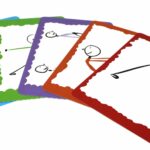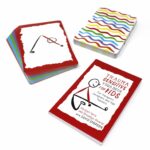Written by Kristin Voris and Brooklyn Alvarez
Reviewed by Natasia Pelowski, New York University
Trauma Sensitive Yoga Deck for Kids: For Therapists, Caregivers, and Yoga Teachers combines yoga practices and psychological science to inform readers on the use of a yoga practice to aid in the treatment of and care for traumatized children.
David Emerson, director of the Center for Trauma and Embodiment at the Justice Resource Institute in Massachusetts, wrote in the preface that the work undergirding this yoga deck shifts it from a traditional focus on yoga in general to a specific application with children who have experienced developmental trauma. Emerson notes that talk therapy, the norm for trauma therapy in cognitive behavioral approaches, is not effective with younger children who, in most cases, don’t have language for their experience. The deck relies on language to facilitate its use, but the emphasis is on the bodily experience itself; the experiences do not need to be explained, or justified or interested, he wrote. Emerson explained that the deck was designed to meet “the wordless horror of chronic abuse and neglect with opportunities for positive body experiences” (XIV).
 The book is geared towards adults treating or taking care of traumatized children between the ages of three and twelve years old. After the Preface and Introduction, the book is divided into nine sections to guide readers through yogic poses considered to be: the four paths to embodiment; ways to get started; games to facilitate somatic play; ways of talking with kids about trauma; and a discussion regarding the research behind these modes of care.
The book is geared towards adults treating or taking care of traumatized children between the ages of three and twelve years old. After the Preface and Introduction, the book is divided into nine sections to guide readers through yogic poses considered to be: the four paths to embodiment; ways to get started; games to facilitate somatic play; ways of talking with kids about trauma; and a discussion regarding the research behind these modes of care.
 The first chapter explores the trauma-sensitive card deck. Unlike typical yoga decks, the Trauma Sensitive Yoga Deck for Kids is trauma informed and somatically focused. Each card depicts various yoga poses that are accessible to young children. The cards depict genderless, culturally neutral figures. There is no alignment discussed throughout the book, thus emphasizing the importance of noticing bodily sensation rather than finding a specific shape. All language use regarding the poses is phrased as “one way” or as a suggestion in order to empower the child (45). The book emphasizes the need to listen to children without immediately trying to problem-solve the trauma. It highlights the need to establish a feeling of safety first.
The first chapter explores the trauma-sensitive card deck. Unlike typical yoga decks, the Trauma Sensitive Yoga Deck for Kids is trauma informed and somatically focused. Each card depicts various yoga poses that are accessible to young children. The cards depict genderless, culturally neutral figures. There is no alignment discussed throughout the book, thus emphasizing the importance of noticing bodily sensation rather than finding a specific shape. All language use regarding the poses is phrased as “one way” or as a suggestion in order to empower the child (45). The book emphasizes the need to listen to children without immediately trying to problem-solve the trauma. It highlights the need to establish a feeling of safety first.
 The process is applicable in a variety of settings including small groups, classrooms, and one-on-one interactions. Therapists incorporating the deck during client sessions are supported to use the games as described verbatim as well as encouraged to be creative and adapt the materials, use them as a starting point thus providing an authentic experience for their clients that is both non-coercive and non-prescriptive.
The process is applicable in a variety of settings including small groups, classrooms, and one-on-one interactions. Therapists incorporating the deck during client sessions are supported to use the games as described verbatim as well as encouraged to be creative and adapt the materials, use them as a starting point thus providing an authentic experience for their clients that is both non-coercive and non-prescriptive.
Finally, the book discusses the etymology of trauma, attachment theory, and trauma-sensitive yoga in practice. While the book acknowledges the development of research that has resulted into current distinctions between PTSD, C-PTSD and developmental trauma, it also acknowledges that more research is needed to scientifically back up most current practices of trauma. The book also includes further reading, notes and a bibliography.
The success of the book lies in its ability to empower the child at all times. It explains the sympathetic nervous system’s fight-or-flight response and how the empowerment of choice can counteract this aspect of post-traumatic-stress.
As a result of the demographically neutral language and easily accessible outlines of the postures, it appeals to a diverse group of readers—this appeal to both knowledgeable information for the adults and accessible information for the children makes this Trauma Sensitive Yoga Deck For Kids For Therapists, Caregivers, and Yoga Teachers stand out among other books on the care of traumatized children.
Kirsten Voris is a trauma-informed yoga instructor and writer who currently lives in southern Arizona.
Brooklyn Alvarez is a yoga instructor and psychologist-in-training (2021).
Natasia Pelowski studies psychology and writing at the Gallatin School of Individualized Study through New York University.
Voris, K., & Alvarez, B. (2019). Trauma sensitive yoga deck for kids: For therapists, caregivers, and yoga teachers. Berkeley, CA: North Atlantic Books.








